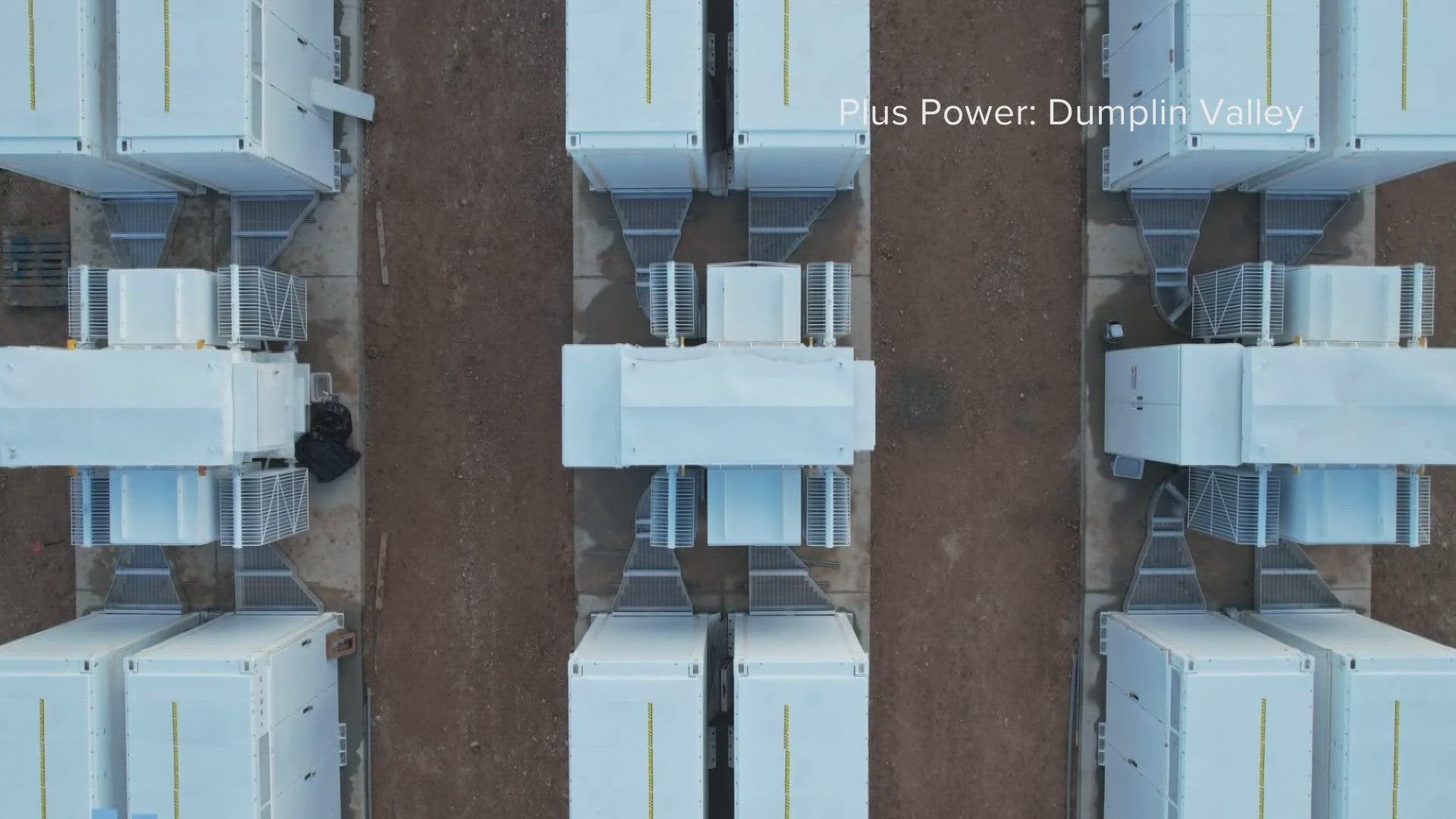JEFFERSON COUNTY, Tenn. — Editor's Note: The original headline implied TVA owned the battery system. They do not. It is owned and operated by a third party.
Jefferson County leaders voted not to approve the construction of a new battery energy storage system (BESS) in the area during a county commission meeting on Monday. If it existed today, it would be one of the largest sites in the U.S. However, there are many other larger ones also in the process of opening.
The BESS project, proposed by energy developers Plus Power, would be a 250 MW, or 1,000 MWh, battery storage system that would give TVA extra power to use during periods of high demand. It could help households in Knoxville and beyond avoid experiencing rolling blackouts.
"The battery storage is not a generator, it doesn't create the electricity. It just acts like a sponge. It absorbs energy when there's too much on the grid. And then it waits and releases that energy back onto the grid. When people come home at night, turn on their lights and appliances, and suddenly electric demand skyrockets," said Polly Shaw, the head of policy and communications with Plus Power.
According to the project's website, construction of the Dumplin Valley facility was expected to start in 2026. It would be developed by Plus Power, which owns and operates energy storage facilities across the U.S.
"We're building in about 28 states, we've got more than 10,000 megawatts worth of projects," Shaw said.
The project would be located on 25 acres of land near New Market, in the Piedmont community.
"The substation on the electric grid near Piedmont is actually a very optimal place for a battery storage facility, it's at a critical need on the Transmission Line. It's a preferred area to build battery storage because it would help to solve transmission and support the more efficient modernization of the electric grid around that area," Shaw said.
She said she believes the project could help attract economic and industrial development to the area because the grid would be able to provide more reliable power.
"What's really important about this project is it'll offer substantial revenue to the county without any drain on public services, like schools or sewers, or police, the property tax, we estimate over the life of the project will be around $20 million," she said.


As of July 17, Plus Power and the Tennessee Valley Authority are not in a partnership, yet. However, both companies are committed to bringing BESS to the state. Scott Key oversees the energy storage initiative at TVA. He said discussions of battery storage have been around for many years.
"We have a lot of nuclear, a lot of hydro, a lot of gas generation — but we also have a lot of coal generation. And so one of our plans is to transition away from our coal generation and transition to newer cleaner sources of energy," he said.
Key said he used to work at the coal plant at Bull Run. He said he feels hopeful about TVA's plans to push for greener energy.
"Our economies are growing, our population is growing, and we're trying to transition away from these coal assets," Key said. "We have to do all the things that coal plants do today in the energy system of the future, because people expect their lights to stay on, and power to be very reliable."
The BESS proposed for Piedmont is in a small farming community. It sits just a few miles from an elementary school. Critics of the BESS plan said they were worried about whether the project would be safe.
"I think a lot of people don't really understand how dangerous that can be. So, I'm hoping we can stop it. Tonight's focus is on safety," said Stephanie Poore, who advocated against the project at Jefferson County's Commission meeting on Monday night.
She wasn't alone. Dozens of other people showed up in protest of the proposal as well. One of the advocates against the BESS was Marian Knight.
"I started going to county meetings," Knight said. "Last summer at the August zoning appeals meeting, they talked about something called a BESS. And I didn't know what that was. I started looking things up. And suddenly, I found out that it was a proposed giant lithium battery facility."
Knight said she spent countless hours of her personal time researching lithium-ion battery facilities. She said she ordered technical manuals, called fire departments, spoke to Tesla manufacturers and called the neighboring communities of existing BESS facilities across the U.S.
She said her biggest concerns stemmed from the history of lithium-ion battery fires in the news. She even pointed to a database from the Electric Resource Power Institute, which shows the most recent fire at a BESS facility was on June 27, 2023, in Warwick, New York. There are about 50 others on the list across the world.
"There was just a fire at a facility in Warwick, New York. And that burned for several days because the weird thing about lithium-ion batteries is that they you can think the fire is out and then it spontaneously reignites so you have to monitor it for days and days," Knight said.


"Yes, there have been incidents. But, I think the important thing for you to realize is that every, all of those reported in the papers were facilities that were built before today's rigorously updated NFPA 855 standard for battery systems," said Shaw.
Knight said she worries that Jefferson County, and specifically the Piedmont community, does not have the fire service infrastructure to handle a big fire.
Jefferson City has a paid fire department. Jefferson County primarily has volunteer departments.
"I want to have water on the site where this is. We hope nothing ever happens at the site. But it's kind of an insurance policy if something bad happens if sparks get out after batteries catch on fire," Knight said.
The National Fire Protection Agency developed the standards which guide stakeholders on how they can mitigate risks with battery storage systems, like the proposed Dumplin Valley facility. It adds requirements for fire detection and suppression, explosion control measures, exhaust ventilation requirements, gas detection methods and thermal runaway.
Poore said the new standard was not enough.
"Our fire departments are not adequately equipped to handle a major fire if one were to break out in the facility, even in one pod, because it burns so hot, so fast," she said.
A petition was distributed against the facility.
In December 2022, Representative Tim Burchett (R-TN) called on TVA to answer for rolling blackouts in the days leading up to Christmas. He sent a letter to the TVA demanding answers as to why it was not prepared to deal with the power demand in the days leading up to Christmas.
He also called for the TVA to fire its president and restructure its board for the rolling blackouts. Project leaders and supporters said the Dumplin Valley facility would help prevent rolling blackouts in the future.

